

Fall - Idioms by The Free Dictionary. Characters to Words Conversion Calculator. Astronomy Answers: Coincidence Periods. Loading [MathJax]/jax/output/CommonHTML/fonts/TeX/fontdata.js 1.
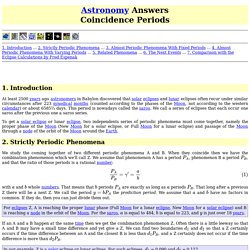
Introduction At least 2500 years ago astronomers in Babylon discovered that solareclipses and lunar eclipses often recur under similar circumstances after 223 synodical months (counted according to the phases of the Moon, not according to the western calendar) or about 6585⅓ days. This period is nowadays called the saros. We call a series of eclipses that each occur one saros after the previous one a saros series. To get a solar eclipse or lunar eclipse, two independents series of periodic phenomena must come together, namely the proper phase of the Moon (New Moon for a solar eclipse, or Full Moon for a lunar eclipse) and passage of the Moon through a node of the orbit of the Moon around the Earth. 2.
We study the coming together of two different periodic phenomena A and B. PAPB=γ′=ab with a and b whole numbers. If an A and a B happen at the same time then we get the combination phenomenon Z. S≡ak+s0(modb) k=l(s−s0)+nb 3. C=PAδ. 16 Government Types - Infographic Facts. 16 Government Types.
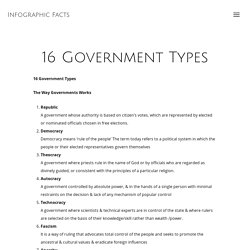
Manninghamappendicesglossary. The words project. word list.the words project. SO MUCH TO TELL YOU: the 100 club. Study Guides and Strategies. Random words. The Dead Words - Weekly Fave on All My Faves. The Philosopher's Meme. Dictionary of Interjections (aww, oh, ah, eek, oops) Godwin's law. Mike Godwin (2010) Godwin's law (or Godwin's Rule of Nazi Analogies)[1][2] is an Internet adage asserting that "As an online discussion grows longer, the probability of a comparison involving Nazis or Hitler approaches 1" [2][3]— that is, if an online discussion (regardless of topic or scope) goes on long enough, sooner or later someone will compare someone or something to Hitler or Nazism.
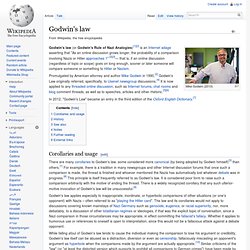
Promulgated by American attorney and author Mike Godwin in 1990,[2] Godwin's Law originally referred, specifically, to Usenet newsgroup discussions.[4] It is now applied to any threaded online discussion, such as Internet forums, chat rooms and blog comment threads, as well as to speeches, articles and other rhetoric.[5][6] In 2012, "Godwin's Law" became an entry in the third edition of the Oxford English Dictionary.[7] Corollaries and usage[edit] History[edit] Godwin has stated that he introduced Godwin's law in 1990 as an experiment in memetics.[2] See also[edit] Notes[edit]
Poe's law. Confusion of parody and sincere expression Poe's law is an adage of Internet culture stating that, without a clear indicator of the author's intent, it is impossible to create a parody of extreme views so obviously exaggerated that it cannot be mistaken by some readers for a sincere expression of the views being parodied.[1][2][3] The original statement, by Nathan Poe, read:[1] Without a winking smiley or other blatant display of humor, it is utterly impossible to parody a Creationist in such a way that someone won't mistake for the genuine article.
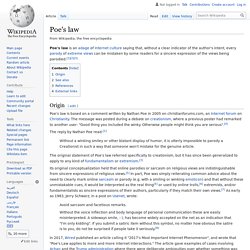
Origin[edit] Poe's law is based on a comment written by Nathan Poe in 2005 on christianforums.com, an Internet forum on Christianity. The post was made during a debate on creationism, where a previous poster had remarked to another user: "Good thing you included the winky. Types of Reasoning. Disciplines > Argument > Types of Reasoning Reasoning within an argument gives the rationale behind why one choice, for example should be selected over another.
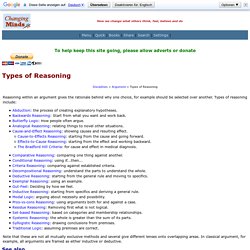
Types of reasoning include: Abduction: the process of creating explanatory hypotheses. Backwards Reasoning: Start from what you want and work back. Butterfly Logic: How people often argue. Note that these are not all mutually exclusive methods and several give different lenses onto overlapping areas. Learning. 100 Most beautiful words in the English language* 100 Beautiful and Ugly Words. Justenglish. Amazing — incredible, unbelievable, improbable, fabulous, wonderful, fantastic, astonishing, astounding, extraordinary.

Verbata. Viewables. 12 Nouns With Absurdly Specific Definitions. Allusory. Skillsets. Wordsworth. WORD! Writing.